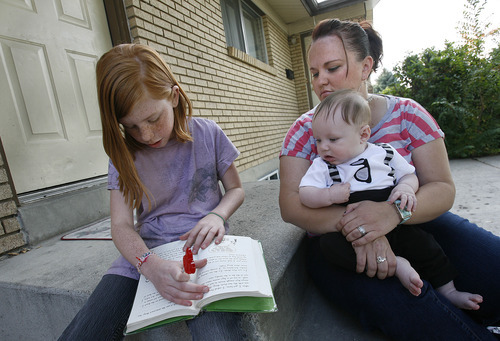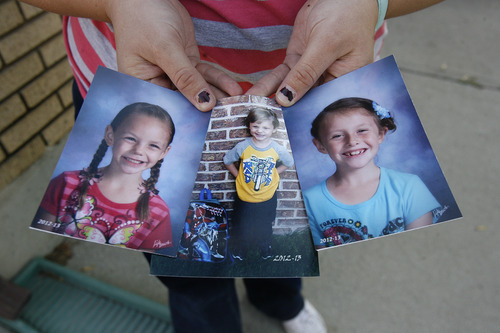This is an archived article that was published on sltrib.com in 2012, and information in the article may be outdated. It is provided only for personal research purposes and may not be reprinted.
Price • Faced with the possibility her nieces and nephews will be legally cut out of her family, an Orem woman is speaking out against what she calls misleading practices by the Division of Child and Family Services.
"I really felt betrayed," said Nina Neubert, who works as a dispatcher for Orem police. "It's been very sad."
A juvenile court judge denied Neubert's petition to adopt her brother's children from foster care last week, ruling the children, ages 7, 6, and 3, should stay with their foster family, who will likely adopt them.
Despite calling the Neuberts and another set of relatives "good families," 7th District Judge Scott Johansen passed on both at a hearing last week, ruling that they hadn't completed required background checks and home studies within a proscribed 120-day window.
"There is no reason to chance another removal when they're doing very well at the home where they are," Johansen said at the hearing. "The potential injury … is not worth the risk."
The case attracted the attention of conservative activist and DCFS critic Darcy Van Orden.
"The best interest of the children is to be with kin," she said. "I do believe that having the children be with family who love them, that have that blood connection is in their best interests."
The children were taken into state custody in January after a neighbor caught a boy allegedly molesting the girls, according to the children's mother, Roxanne Gerrish. DCFS wanted to talk to the children after the neighbor called police, but Gerrish missed the first two appointments with child welfare workers — she said because she doesn't have a car. Gerrish was on probation following a drug possession charge at the time and said that when she did arrive at the meeting, investigators focused on her and her husband, both of whom have a history of drug use.
"I knew they were out to get my kids," she said. "Two hours later, they had warrants."
Her husband tested positive for drugs in a urine test. Gerrish's urine test came back clean, but drugs were found in a hair follicle test, she admitted. The children were taken into state custody and initially went to live with her mother, Barbara Durand, in Ferron.
They lived with her for about four months, until the April day that the youngest boy, age 3, wandered away from her backyard where he was playing. He was found by a police officer near a road.
Durand is appealing a DCFS finding of non-supervision, but the children were still removed from her care and place in a state facility.
The search was back on for another family member to take the kids.
Neubert again said she would adopt the children, but Durand pushed instead for the children's great-uncle. When he failed a background check, the children instead went to a foster family.
After the uncle was denied in May, Neubert and her husband started the process of getting approval to take the kids. The couple underwent background checks and home inspections — not knowing the 120-day clock was still ticking, or that they would be required to finish the process within that window.
By the time they were approved in July, the window was shut. Neubert contends she was misled by child welfare workers who told her she couldn't begin her application while the uncle's was still on the table and that the kids would be best off in foster care while the approval process was ongoing.
"They said it was best to stay where they're at," she said, but then "turn[ed] around and use[d] that against us," by saying the children had formed a bond in months with the foster parents. DCFS workers declined to comment following the hearing.
At last week's hearing, state officials said neither the Neuberts nor the other family, one of the girls' paternal grandparents, went through the state approval process within a proscribed 120-day window. But Neubert contends that she was misled about the process and never told she needed to be fully vetted and approved within that time.
A state DCFS confirmed that the agency only gives kin preference for the first 120 days, but said relatives only have to come forward and express interest — they aren't required to finish all the background checks and home studies within that window.
"The 120 days was put in there because time is ticking and the children are bonding with whoever they're with," said DCFS kinship program administrator Judy Hull.
Still, "a judge can say and do whatever they want," Hull said.
And in the Gerrish case, Johansen sided with state workers who testified that the damage to the children if they are moved could be insurmountable. The children have now been with the foster family five months.
"The children need to know where they're going to be, they need to know where they're going to live," said guardian ad-litem Connie Mower, an attorney assigned to look out for their interests. "I, for one, don't want to risk very real, possibly permanent, damage with another placement."
The children's foster family plans to allow the biological family to visit and maintain relationships, she said, but not if there are "hard feelings and discord."
Neubert knows that could change and plans to appeal the judge's decision.
"I believe we should look at the future 20 years from now," Neubert told the judge. "I have the best interests of the kids at heart and I believe they should be back with family."
Twitter: @lwhitehurst





